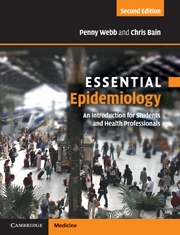Book contents
- Frontmatter
- Contents
- Foreword
- Preface
- 1 Epidemiology is…
- 2 How long is a piece of string? Measuring disease frequency
- 3 Who, what, where and when? Descriptive epidemiology
- 4 Healthy research: study designs for public health
- 5 Why? Linking exposure and disease
- 6 Heads or tails: the role of chance
- 7 All that glitters is not gold: the problem of error
- 8 Muddied waters: the challenge of confounding
- 9 Reading between the lines: reading and writing epidemiological papers
- 10 Who sank the boat? Association and causation
- 11 Assembling the building blocks: reviews and their uses
- 12 Outbreaks, epidemics and clusters
- 13 Watching not waiting: surveillance and epidemiological intelligence
- 14 Prevention: better than cure?
- 15 Early detection: what benefits at what cost?
- 16 A final word…
- Answers to questions
- Appendix 1 Direct standardisation
- Appendix 2 Standard populations
- Appendix 3 Calculating cumulative incidence and lifetime risk from routine data
- Appendix 4 Indirect standardisation
- Appendix 5 Calculating life expectancy from a life table
- Appendix 6 The Mantel-Haenszel method for calculating pooled odds ratios
- Appendix 7 Formulae for calculating confidence intervals for common epidemiological measures
- Glossary
- Index
- References
1 - Epidemiology is…
- Frontmatter
- Contents
- Foreword
- Preface
- 1 Epidemiology is…
- 2 How long is a piece of string? Measuring disease frequency
- 3 Who, what, where and when? Descriptive epidemiology
- 4 Healthy research: study designs for public health
- 5 Why? Linking exposure and disease
- 6 Heads or tails: the role of chance
- 7 All that glitters is not gold: the problem of error
- 8 Muddied waters: the challenge of confounding
- 9 Reading between the lines: reading and writing epidemiological papers
- 10 Who sank the boat? Association and causation
- 11 Assembling the building blocks: reviews and their uses
- 12 Outbreaks, epidemics and clusters
- 13 Watching not waiting: surveillance and epidemiological intelligence
- 14 Prevention: better than cure?
- 15 Early detection: what benefits at what cost?
- 16 A final word…
- Answers to questions
- Appendix 1 Direct standardisation
- Appendix 2 Standard populations
- Appendix 3 Calculating cumulative incidence and lifetime risk from routine data
- Appendix 4 Indirect standardisation
- Appendix 5 Calculating life expectancy from a life table
- Appendix 6 The Mantel-Haenszel method for calculating pooled odds ratios
- Appendix 7 Formulae for calculating confidence intervals for common epidemiological measures
- Glossary
- Index
- References
Summary
Box 1.1 Epidemiology is…
‘The science of epidemics’ (Concise Oxford Dictionary, 1964)
‘The science of the occurrence of illness’ (Miettinen, 1978)
‘The study of the distribution and determinants of disease in humans’ (MacMahon and Pugh, 1970)
‘The study of the distribution and determinants of health-related states or events in specified populations, and the application of this study to control of health problems’ (Porta, 2008)
So what is epidemiology anyway? As shown in Box 1.1, the Concise Oxford Dictionary (1964) defined it accurately, but not very helpfully, as ‘the science of epidemics’. In 1970, MacMahon and Pugh came up with something a bit more concrete: ‘the study of the distribution and determinants of disease’. Their definition succinctly identifies the two core strands of traditional epidemiology: who is developing disease (and where and when), and why are they developing it? The final definition, from the Dictionary of Epidemiology (Porta, 2008) takes it two steps further by broadening the scope to include health in general, not just disease, as well as highlighting the direct role of epidemiology in disease control.
Epidemiology, therefore, is about measuring health, identifying the causes of ill-health and intervening to improve health; but what do we mean by ‘health’? Back in 1948, the World Health Organization (WHO, 1948) defined it as ‘…a state of physical, mental and social well-being’. Now, while this view is clearly what we hope for as individuals, the inclusion of ‘mental and social well-being’ would until recently have induced despair in epidemiologists.
- Type
- Chapter
- Information
- Essential EpidemiologyAn Introduction for Students and Health Professionals, pp. 1 - 28Publisher: Cambridge University PressPrint publication year: 2010

